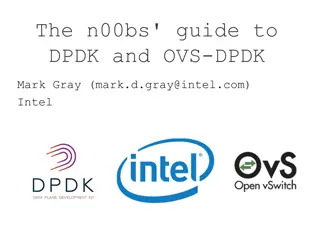
Openvswitch Performance Analysis & Measurements by Madhu Challa
Explore the performance measurements and analysis of Openvswitch by Madhu Challa. Discover tools used, throughput and latency stats, effects of increasing kernel flows, and more. Dive into the detailed analysis of single flow/core performance and the impact of cache misses.
Download Presentation

Please find below an Image/Link to download the presentation.
The content on the website is provided AS IS for your information and personal use only. It may not be sold, licensed, or shared on other websites without obtaining consent from the author. If you encounter any issues during the download, it is possible that the publisher has removed the file from their server.
You are allowed to download the files provided on this website for personal or commercial use, subject to the condition that they are used lawfully. All files are the property of their respective owners.
The content on the website is provided AS IS for your information and personal use only. It may not be sold, licensed, or shared on other websites without obtaining consent from the author.
E N D
Presentation Transcript
OpenVswitch Performance measurements & analysis Madhu Challa
Tools used Packet Generators Dpdk-Pktgen for max pps measurements. Netperf to measure bandwidth and latency from VM to VM. Analysis top, sar, mpstat, perf Netsniff-ng toolkit I use the term flow interchangeably. Unless otherwise mentioned flow refers to a unique tuple < SIP, DIP, SPORT, DPORT > Test servers are Cisco UCS C220-M3S servers with 24 cores. 2 socket Xeon CPUs E5-2643@3.5 GHz with 256 Gbytes of RAM. NIC cards are Intel 82599EB and XL710 (support VXLAN offload) Kernel used is Linux 3.17.0-next-20141007+
NIC-OVS-NIC (throughput) Single flow / Single core 64 byte udp raw datapathswitching performance with pktgen. ovs-ofctl add-flow br0 "in_port=1 actions=output:2" STANDARD-OVS DPDK-OVS LINUX-BRIDGE Gbits / sec 1.159 9.9 1.04 Mpps 1.72 14.85 1.55 Standard OVS 1.159 GBits / sec / 1.72 Mpps Scales sub-linearly with addition of cores (flows load balanced to cores) due to locking in sch_direct_xmitand ovs_flow_stats_update). Drops due to rx_missed_errors. Ksoftirqdsat 100% ethtool-N eth4 rx-flow-hash udp4 sdfn. service irqbalance stop. 4 cores 3.5 Gbits / sec. Maximum achievable rate with many flows 6.8 Gbits / sec / 10 Mpps, and it would take a packet size of 240 bytes to saturate a 10G link. DPDK OVS 9.9 Gbits / sec / 14.85 Mpps. Yes this is for one core. Latest OVS starts a PMD thread per numa node. Linux bridge 1.04Gbits / sec / 1.55 Mpps.
NIC-OVS-NIC (latency) Latency measured using netperf TCP_RR and UDP_RR. Numbers in micro seconds per packet. VM VM numbers use two hypervisors with VXLAN tunneling and offloads, details in later slide. VM-OVS-OVS-VM OVS DPDK-OVS LINUX-BRIDGE NIC-NIC TCP 46 33 43 27 72.5 UDP 51 32 44 26.2 66.4
Effect of increasing kernel flows Kernel flows are basically a cache. OVS performs very well so long as packets hit this cache. The cache supports up to 200,000 flows (ofproto_flow_limit). Default flow idle time is 10 seconds. If revalidation takes a long time, the flow_limit and default idle times are adjusted so flows can be removed more aggressively. In our testing with 40 VMs, each running netperf TCP_STREAM, UDP_STREAM, TCP_RR, UDP_RR between VM pairs (each VM on one hypervisor connects to every other VM on the other hypervisor) we have not seen this cache grow beyond 2048 flows. The throughput numbers degrade by about 5% when using 2048 flows.
Effect of cache misses To stress the importance of the kernel flow cache I ran a test completely disabling the cache. may_put=false or ovs-appctl upcall/set-flow-limit. The result for the multi flow test presented in slide 3. 400 Mbits / sec, approx 600 Kpps Loadavg 9.03, 37.8%si, 7.1%sy, 6.7%us Most of these due to memory copies. - 4.73% 4.73% [kernel] [k] memset - memset - 58.75% __nla_put - nla_put + 86.73% ovs_nla_put_flow + 13.27% queue_userspace_packet + 30.83% nla_reserve + 8.17% genlmsg_put + 1.22% genl_family_rcv_msg 4.92% [kernel] [k] memcpy 3.79% [kernel] [k] netlink_lookup 3.69% [kernel] [k] __nla_reserve 3.33% [ixgbe] [k] ixgbe_clean_rx_irq 3.18% [kernel] [k] netlink_compare 2.63% [kernel] [k] netlink_overrun
VM-OVS-NIC-NIC-OVS-VM Two KVM hypervisors with a VM running on each, connected with flow based VXLAN tunnel. Table shows results of various netperf tests. VMs use vhost-net netdev tap,id=vmtap,ifname=vmtap100,script=/home/mchalla/demo- scripts/ovs-ifup,downscript=/home/mchalla/demo-scripts/ovs- ifdown,vhost=on -device virtio-net-pci,netdev=vmtap. /etc/default/qemu-kvm VHOST_NET_ENABLED=1 Table shows three tests. Default 3.17.0-next-20141007+ kernel with all modules loaded and no VXLAN offload. IPTABLES module removed. (ipt_do_table has lock contention that was limiting performance) IPTABLES module removed + VXLAN offload.
VM-OVS-NIC-NIC-OVS-VM Throughput numbers in Mbits / second. RR numbers in transactions / second. TCP_STREAM UDP_STREAM TCP_MAERTS TCP_RR UDP_RR DEFAULT 6752 6433 5474 13736 13694 NO IPT 6617 7335 5505 13306 14074 OFFLOAD 4766 9284 5224 13783 15062 Interface MTU was 1600 bytes. TCP message size 16384 vs UDP message size 65507. RR uses 1 byte message. The offload gives us about 40% improvement for UDP. TCP numbers low possibly because netserver is heavily loaded. (Needs further investigation)
VM-OVS-NIC-NIC-OVS-VM Most of the overhead here is copying packets into user space and vhost signaling and associated context switches. Pinning KVMs to cpus might help. NO IPTABLES 26.29% [kernel] [k] csum_partial 20.31% [kernel] [k] copy_user_enhanced_fast_string 3.92% [kernel] [k] skb_segment 4.68% [kernel] [k] fib_table_lookup 2.22% [kernel] [k] __switch_to NO IPTABLES + OFFLOAD 9.36% [kernel] [k] copy_user_enhanced_fast_string 4.90% [kernel] [k] fib_table_lookup 3.76% [i40e] [k] i40e_napi_poll 3.73% [vhost] [k] vhost_signal 3.06% [vhost] [k] vhost_get_vq_desc 2.66% [kernel] [k] put_compound_page 2.12% [kernel] [k] __switch_to
Flow Mods / second We have scripts (credit to Thomas Graf) that create an OVS environment where a large number of flows can be added and tested with VMs and docker instances. Flow Mods in OVS are very fast, 2000 / sec.
Connection Tracking I used dpdk pktgen to measure the additional overhead of sending a packet to the conntrack module using a very simple flow. This overhead is approx 15-20%
Future work Test simultaneous connections with IXIA / breaking point. Connection tracking feature needs more testing with stateful connections. Agree on OVS testing benchmarks. Test DPDK based tunneling.
Demo DPDK test. VM VM test.















